Tutuban | ||||||||||||||||||||
|---|---|---|---|---|---|---|---|---|---|---|---|---|---|---|---|---|---|---|---|---|
 Exterior of the PNR Executive Building on Mayhaligue Street, which currently serves as the Tutuban railway station terminal. | ||||||||||||||||||||
| General information | ||||||||||||||||||||
| Other names | Manila, Tayuman, Divisoria | |||||||||||||||||||
| Location | Mayhaligue Street, Tondo Manila, Metro Manila Philippines | |||||||||||||||||||
| Coordinates | 14°36′41″N 120°58′24″E / 14.6114°N 120.9732°E | |||||||||||||||||||
| Owned by | Department of Transportation | |||||||||||||||||||
| Operated by | Philippine National Railways | |||||||||||||||||||
| Line(s) | North Main Line South Main Line Planned: North–South Commuter | |||||||||||||||||||
| Platforms | 3 island platforms | |||||||||||||||||||
| Tracks | 6 | |||||||||||||||||||
| Connections | Jeepneys, cycle rickshaws, FX, taxis Future: | |||||||||||||||||||
| Construction | ||||||||||||||||||||
| Parking | Yes | |||||||||||||||||||
| Bicycle facilities | Bicycle parking available | |||||||||||||||||||
| Accessible | Yes | |||||||||||||||||||
| Other information | ||||||||||||||||||||
| Station code | TU (commuter) MA (intercity) | |||||||||||||||||||
| History | ||||||||||||||||||||
| Opened | March 24, 1891 | |||||||||||||||||||
| Rebuilt | 1996 | |||||||||||||||||||
| Previous names | Central Station[1] | |||||||||||||||||||
| Services | ||||||||||||||||||||
| ||||||||||||||||||||
| Location | ||||||||||||||||||||
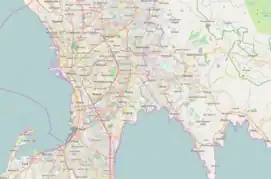 Tutuban Location within Metro Manila | ||||||||||||||||||||
PNR Metro Commuter | |||||||||||||||||||||||||||||||||||||||||||||||||||||||||||||||||||||||||||||||||||||||||||||||||||||||||||||||||||||||||||||||||||||||||||||||||||||||||||||||||||||||||||||||||||||||||||||||||||||||||||||||||||||||||||||||||||||||||||||||||||||||||||||||||||||||||||||||||||||||||||||||||||||||||||||||||||||||||||||||||||||||||||||||||||||||||||||||||||||||||||||||||||||||||||||||||||||||||||||||||||||||||||||||||||||||||||||||||||||||||||||||||||||||||||||||||||||||||||||||||||||||||||||||||||||||||||||||||||||||||||||||||||||||||||||||||||||||||||||||||||||||||||||||||||||||
|---|---|---|---|---|---|---|---|---|---|---|---|---|---|---|---|---|---|---|---|---|---|---|---|---|---|---|---|---|---|---|---|---|---|---|---|---|---|---|---|---|---|---|---|---|---|---|---|---|---|---|---|---|---|---|---|---|---|---|---|---|---|---|---|---|---|---|---|---|---|---|---|---|---|---|---|---|---|---|---|---|---|---|---|---|---|---|---|---|---|---|---|---|---|---|---|---|---|---|---|---|---|---|---|---|---|---|---|---|---|---|---|---|---|---|---|---|---|---|---|---|---|---|---|---|---|---|---|---|---|---|---|---|---|---|---|---|---|---|---|---|---|---|---|---|---|---|---|---|---|---|---|---|---|---|---|---|---|---|---|---|---|---|---|---|---|---|---|---|---|---|---|---|---|---|---|---|---|---|---|---|---|---|---|---|---|---|---|---|---|---|---|---|---|---|---|---|---|---|---|---|---|---|---|---|---|---|---|---|---|---|---|---|---|---|---|---|---|---|---|---|---|---|---|---|---|---|---|---|---|---|---|---|---|---|---|---|---|---|---|---|---|---|---|---|---|---|---|---|---|---|---|---|---|---|---|---|---|---|---|---|---|---|---|---|---|---|---|---|---|---|---|---|---|---|---|---|---|---|---|---|---|---|---|---|---|---|---|---|---|---|---|---|---|---|---|---|---|---|---|---|---|---|---|---|---|---|---|---|---|---|---|---|---|---|---|---|---|---|---|---|---|---|---|---|---|---|---|---|---|---|---|---|---|---|---|---|---|---|---|---|---|---|---|---|---|---|---|---|---|---|---|---|---|---|---|---|---|---|---|---|---|---|---|---|---|---|---|---|---|---|---|---|---|---|---|---|---|---|---|---|---|---|---|---|---|---|---|---|---|---|---|---|---|---|---|---|---|---|---|---|---|---|---|---|---|---|---|---|---|---|---|---|---|---|---|---|---|---|---|---|---|---|---|---|---|---|---|---|---|---|---|---|---|---|---|---|---|---|---|---|---|---|---|---|---|---|---|---|---|---|---|---|---|---|---|---|---|---|---|---|---|---|---|---|---|---|---|---|---|---|---|---|---|---|---|---|---|---|---|---|---|---|---|---|---|---|---|---|---|---|---|---|---|---|---|---|---|---|---|---|---|---|---|---|---|---|---|---|---|---|---|---|---|---|---|---|---|---|---|---|---|---|---|---|---|---|---|---|---|---|---|---|---|---|---|---|---|---|---|---|---|---|---|---|---|---|---|---|---|---|---|---|---|---|---|---|---|---|---|---|---|---|---|---|---|---|---|---|---|---|---|---|---|---|---|---|---|---|---|---|---|---|---|
| |||||||||||||||||||||||||||||||||||||||||||||||||||||||||||||||||||||||||||||||||||||||||||||||||||||||||||||||||||||||||||||||||||||||||||||||||||||||||||||||||||||||||||||||||||||||||||||||||||||||||||||||||||||||||||||||||||||||||||||||||||||||||||||||||||||||||||||||||||||||||||||||||||||||||||||||||||||||||||||||||||||||||||||||||||||||||||||||||||||||||||||||||||||||||||||||||||||||||||||||||||||||||||||||||||||||||||||||||||||||||||||||||||||||||||||||||||||||||||||||||||||||||||||||||||||||||||||||||||||||||||||||||||||||||||||||||||||||||||||||||||||||||||||||||||||||
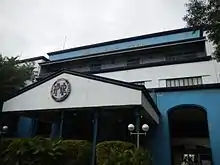
Tutuban station (also known as Manila station or Divisoria station) is the central railway terminus of the Philippine National Railways (PNR) network located in the city of Manila, Philippines.
The name refers to two stations: the original Tutuban station, which today forms part of Tutuban Center, and the PNR Executive Building, which houses PNR offices.
History
Tutuban station was built as part of the "Ferrocarril de Manila-Dagupan" or the Manila-Dagupan Line, which constitutes much of the North Main Line today. The cornerstone of the main station building at Tutuban was laid on July 31, 1887.[2] The railway was 195 kilometers (121 mi) long at the time of its opening on November 24, 1892, running from Manila to Dagupan in Pangasinan. The Manila Railroad Company (MRR) was renamed Philippine National Railways (PNR) under Republic Act No. 4156 enacted after World War II.[3]
In 1988, PNR evaluated the possibility of renting 22 hectares (54 acres) of land to Tutuban at C.M. Recto Avenue in response to the challenges of development and help promote the site to be the center of trade. PNR implemented the first part of the master development plan of Tutuban Properties, Inc. in 1991, and later entrusted the management and development of the land. The Tutuban Center Mall was formally inaugurated to the public led by President Fidel V. Ramos on February 21, 1994.
The following years have witnessed the continued efforts among PNR, Tutuban Properties, Inc., and the Philippine Government to advance the methods of travel by reorganizing the overall railroad system, improve the civic and business buildings around the Tutuban, and keep the emphasis on history. The development of PNR Plaza is a step to verify the cause of reactivating the overall railroad system as one method of travel and trading.
The Tutuban Station Executive Building was inaugurated on May 30, 1996.
Tutuban station will be renovated to become more transit-oriented and a newer station will be built for the North–South Commuter Railway while the 1996 station will serve only the Manila-Legazpi long-haul intercity services if revived. According to a presentation by JICA in 2019, the old station building nicknamed the "Heritage Building" will be once more included in a transit-oriented mixed-use zone. Therefore, the Tutuban Center Mall that sits in the area of the station will be removed. It will also connect to the LRT Line 2 for ease of transferring between lines.
Gallery
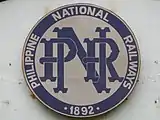 Philippine National Railways seal
Philippine National Railways seal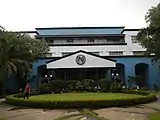 Façade
Façade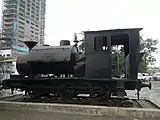 Vintage 0-6-0 "Dagupan" steam locomotive
Vintage 0-6-0 "Dagupan" steam locomotive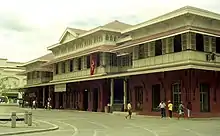 Exterior of the original Tutuban station built in 1892, which today is part of Tutuban Center
Exterior of the original Tutuban station built in 1892, which today is part of Tutuban Center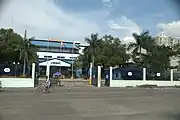 Façade of the PNR Tutuban station
Façade of the PNR Tutuban station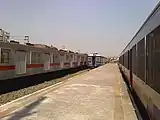 Platform 2
Platform 2 Interior of Tutuban Center Main Building with the existing columns of the old Tutuban station
Interior of Tutuban Center Main Building with the existing columns of the old Tutuban station Historical marker of the Tutuban Center Main Building
Historical marker of the Tutuban Center Main Building Iron Corinthian column at Tutuban Center Mall
Iron Corinthian column at Tutuban Center Mall Restored lobby wall of the old Tutuban station
Restored lobby wall of the old Tutuban station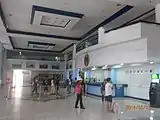 Lobby of the current Tutuban station
Lobby of the current Tutuban station Historical marker at the new Tutuban station
Historical marker at the new Tutuban station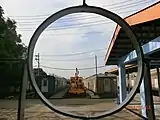 PNR depot in Tutuban
PNR depot in Tutuban.JPG.webp) Façade of the old Tutuban station. Currently the Tutuban Center Mall
Façade of the old Tutuban station. Currently the Tutuban Center Mall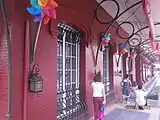 Tutuban Center Mall. Formerly the old Tutuban station façade
Tutuban Center Mall. Formerly the old Tutuban station façade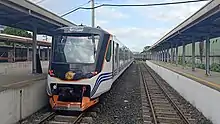 Tutuban station in December 2019, with an INKA 8000 class DMU parked in the platform
Tutuban station in December 2019, with an INKA 8000 class DMU parked in the platform
See also
References
- ↑ General Map of the Island of Luzon, Phil. Is. Showing the Manila Railroad Company's Railway & Water Lines (Map). 1:1,060,000. Bureau Coast and Geodetic Survey Litho. 1930. Retrieved March 25, 2022.
- ↑ "Philippine National Railways; Main Lines on Luzon". Geocities. Retrieved May 3, 2014.
- ↑ "PNR in Philippine History". Philippine National Railways. Archived from the original on February 19, 2015. Retrieved May 3, 2014.